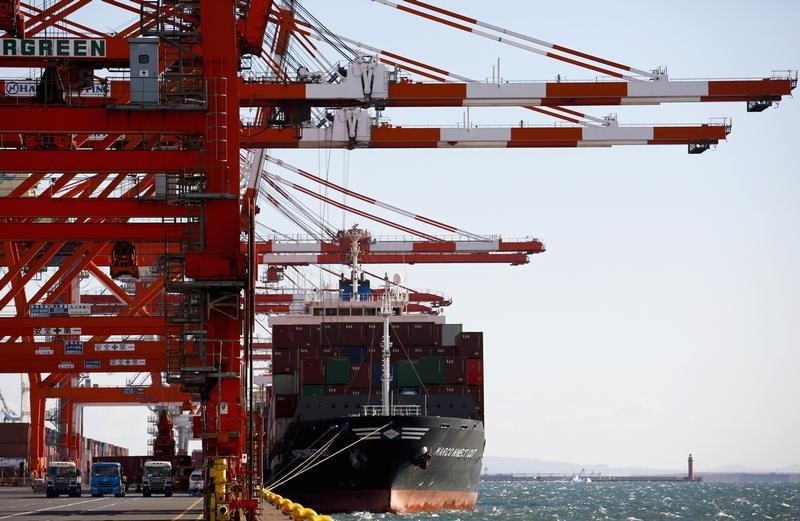By Tetsushi Kajimoto and Mari Saito
TOKYO (Reuters) - Japan's annual exports in January jumped the most since late 2013 in an encouraging sign a weak yen is finally boosting the nation's all-important export engine and helping the economy crawl out of recession.
The 17.0 percent year-on-year gain in exports marked the fifth straight month of increase, supported by shipments of cars to the United States and of electronics parts to Asia, data by the Ministry of Finance showed.
Ministry officials say exports are on a firm footing, adding that special factors helped boost shipments such as a rebound from last year's Chinese New Year holidays which fell in January, and extreme cold weather which hit the U.S. economy a year ago.
A pickup in shipments - which had been a soft spot in the economy - is welcome news for policymakers who hope exports will offset still-weak private consumption, and cheaper oil prices will spur firms to spend more on wages and investment, generating a virtuous growth cycle.
And with the economy recovering at a subdued pace after slipping into recession last year, stronger exports growth would let the central bank hold off on any additional stimulus.
Bank of Japan Governor Haruhiko Kuroda said on Wednesday he saw no need now to expand monetary stimulus as the bank raised its view on output and exports and stuck to its assessment that the world's third largest economy is recovering moderately.
"The BOJ will wait to see how oil prices may impact people's deflationary mindset, and brisk trade data will encourage Kuroda to stand pat on policy for the time being," said Takeshi Minami, chief economist at Norinchukin Research Institute.
A jump in export volume suggests that Japanese exporters who have gained hefty profits due to a weak yen are lowering exporting prices to boost shipments, Minami added.
Nissan Motor Co is trying to boost car exports from Japan to benefit from the weaker yen. Honda Motor Co, which has virtually no exports from Japan now, aims to ship abroad about 10-20 percent of its cars built at home.
January exports topped a 11.9 percent annual gain expected by economists in a Reuters poll, following a 12.8 percent rise in December.
Export volume grew 11.2 percent, the fastest gain since December 2010.
Imports fell 9.0 percent in the year to January, due to slumping oil prices, narrowing the trade deficit to 1.18 trillion yen ($9.94 billion), but still a record run of shortfalls stretching 31 months.
Exports to the United States rose 16.5 percent on-year in January, while those to Asia, which account for more than half of Japanese exports, grew 22.7 percent, driven by a rush in demand before the Chinese New Year holidays.

($1 = 118.6900 yen)